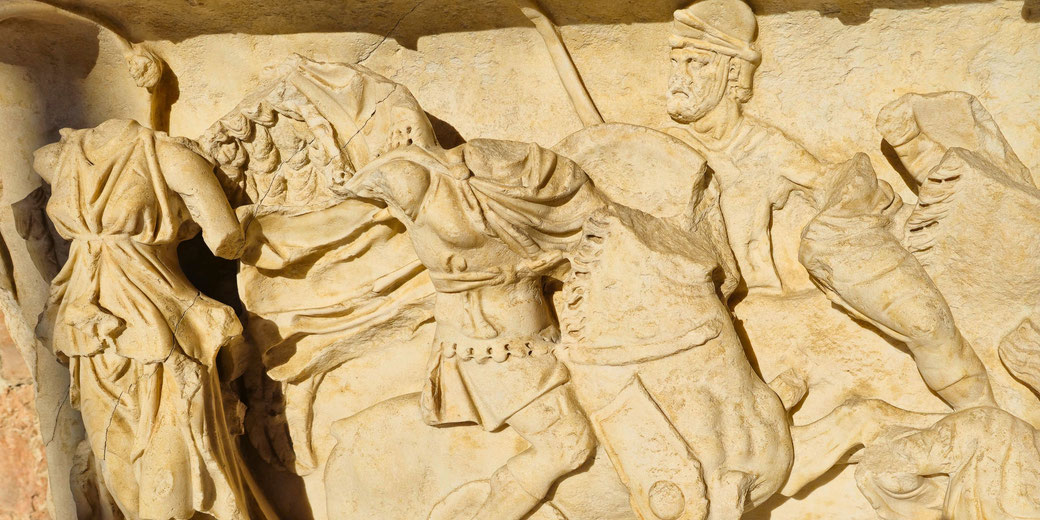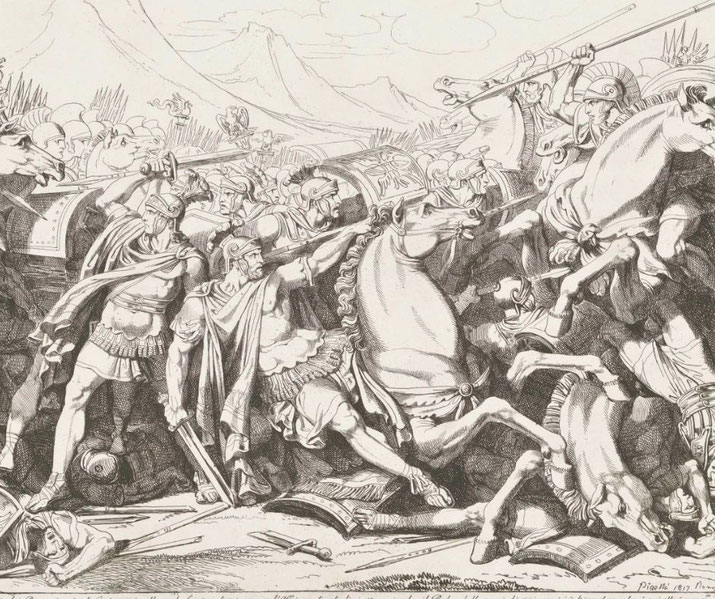Hannibal's stunning victories against Rome at the Ticinus and Trebia Rivers

At the start of the Second Punic War in 218 BC, Hannibal and his army of 20,000 men crossed the Alps into Italy.
His goal was to defeat the Roman army and conquer Rome. In November of that year, he achieved a major victory over the Romans at the Battle of Ticinus River. A month later, in December, he won another battle against them at Trebia River.
But how did Hannibal achieve these two early victories against the Roman Republic?
Why did Hannibal attack Rome?
Rome and Carthage had fought each other during the First Punic War in Sicily from 264-241 BC.
Carthage had been defeated and forced to pay a large indemnity to Rome. In order to pay this, Carthage had to tax their citizens heavily.
This led to resentment among the Carthaginians, especially the nobility and military leaders.
Also, following the defeat in the First Punic War, Carthage had fought a civil war against its own mercenary soldiers who they could no longer afford to pay.
Carthage won the conflict, but it cost them dearly in terms of money and manpower.
In order to rebuild their shattered empire, they had to find new sources of income.
Carthage tasked one of their more experienced generals, Hamilcar Barca, to travel to the Iberian Peninsula (modern Spain) and conquer it.
This would give them a new source of revenue since there were rich silver mines in the region.
Hamilcar was successful in this endeavor, and he even managed to get his son, Hannibal, involved in the campaign.
How Hannibal Barca came to power
Hannibal was born in 247 BC in what is now Tunisia. His father, Hamilcar, was a prominent Carthaginian general who had played a leading role in the First Punic War.
Hannibal grew up hearing stories of Rome's atrocities during that conflict and developed a strong hatred for the Romans.
As he got older, he became an experienced soldier himself and served under his father in Spain.
When Hamilcar died during the winter of 229-228 BC, command of the Carthaginian forces in Spain passed to Hamilcar's son-in-law, Hasdrubal.
Hannibal served under him as well and was given the command of a cavalry unit. In 221 BC, Hasdrubal was assassinated, and Hannibal took command of the Carthaginian forces in Spain.
The causes of the Second Punic War
The primary cause of the Second Punic War was Rome's fear of Carthaginian expansion.
In addition, Hannibal's father, Hamilcar Barca, had never forgiven Rome for their victory in the First Punic War.
He had vowed to take revenge and made his young son, Hannibal, swear that he would never be a friend of Rome.
The Second Punic War broke out in 218 BC over a town called Saguntum in Spain. Saguntum was a Roman ally, and Hannibal's army attacked and captured it in 219 BC after an eight-month siege.
Angered by the aggression against the city, the Romans sent diplomats to the city of Carthage and demanded that Hannibal surrender himself to Rome.
However, Carthage refused to do this, so Rome declared war.
Hannibal's march to Italy
Hannibal knew that he could not afford to wait in Spain for the Romans to attack him. Instead, Hannibal decided to go on the initiative.
His plan was to take the Carthaginian army into Italy and attack Roman cities there.
He hoped that by doing this, he would stir up rebellion among the allied Italian cities of Rome and encourage them to become allies of Carthage instead.
Hannibal set out from Spain in May of 218 BC with an army of 50,000 infantry, 9,000 cavalry, and 37 war elephants.
In order to get to Italy, he had to march from Spain, across the Pyrenees Mountains, through southern France, pass through the Alps, and then finally into Italy.
This was a journey of over 1500 miles and it took him almost five months to complete.
The journey was long and difficult, and Hannibal was forced to fight a series of battles against local Gallic tribes along the way.
As a result of this, he suffered continual losses in men and supplies.
Rome had been alerted to the movement of this large army by an allied city in southern France, called Massilia.
The Romans sent an army, under the command of Publius Cornelius Scipio, to intercept Hannibal in southern France.
However, Hannibal was able to outmaneuver Scipio and continue his march to Italy.
Hannibal's crossing of the Alps
This event is one of the most famous military feats in history. In order to cross the imposing Alps mountain range, Hannibal had to find a pass that was not too steep and treacherous for his troops.
He also had to make sure that there was enough grass for his elephants to eat along the way.
After weeks of searching, he finally found a pass that he thought would work.
The first part of the passage was relatively safe and had plenty of grass for the elephants.
However, halfway through, the path became much steeper and narrower. The conditions quickly became dangerous with heavy snow and ice, sporadic landslides and even hostile local tribes attacking them along the way.
During the fifteen-day trek in the harsh conditions, many men and animals fell off sheer cliffs to their deaths.
Despite these losses, Hannibal continued on and eventually made it through the Alps with a small portion of his original army still intact.
Unfortunately, most of the elephants had also perished along the way.
The Battle of Ticinus River
Hannibal's first major victory in Italy came at the Battle of Ticinus River. This battle was fought in November of 218 BC, just a few weeks after Hannibal had crossed the Alps and descended into the Po River valley in northern Italy.
There, Hannibal had forged crucial alliances with various local Gallic tribes who significantly bolstered his forces and provided vital knowledge about the nearby terrain.
The Roman army that Hannibal defeated at Ticinus River was led by Publius Cornelius Scipio, the same general who had tried to stop him in southern France.
The two armies met near the Ticinus River, in northwestern Italy. Hannibal had under his command around 6,000 Libyan and Iberian cavalry. He also had a few of his original 37 elephants remaining.
In comparison, Scipio's force was comprised of around 3,600 Roman and auxiliary cavalry, and some light missile infantry known as velites.
The battle started with Scipio sending his velites forward to throw javelins at the enemy.
Hannibal ordered his cavalry to charge at them before they could throw the missiles, causing the velites to retreat.
Seeing the danger to his light infantry, Scipio ordered his horsemen to counter-charge Hannibal's cavalry.
However, the Roman cavalry got tangled in the retreating velites and the charge stopped.
The Carthaginian forces then surrounded the confused Romans and easily defeated them.
Scipio tried to turn the tide of the disaster and charge into the combat with his own cavalry unit.
However, he also became trapped and was injured. Scipio's son, who was also called by the same name (Publius Cornelius Scipio) charged in with his reserve cavalry, saved his father, and they both fled from the battlefield.
Ultimately, the elder Scipio had been too aggressive with his approach to the battle, and Hannibal had used this to his advantage.
The victory at the Ticinus River was a significant one for Hannibal. Not only did he defeat his first Romans army, but he also inflicted heavy casualties on them.
Out of the original force of around 3,600 men that Scipio started with, only around 1,200 returned to their camp.

The Battle of Trebia River
Hannibal's next major victory came in December of 218 BC at the Battle of Trebia River.
This battle was fought against a Roman army led by Tiberius Sempronius Longus. The two armies met near the city of Placentia, in northern Italy.
Hannibal now had 30,000 soldiers since a number of Gallic tribes in the Po River valley had become his allies. This included around 10,000 cavalry.
Sempronius Longus' Roman army was larger, at around 40,000. This was comprised of around 36,000 Roman and allied infantry, and 4,000 cavalry.
Tiberius Sempronius Longus was eager to fight Hannibal, as his year as consul was coming to an end and he wanted to achieve military glory before that happened.
The two forces built their camps on opposite sides of the river. In the early hours of the morning, Hannibal dispatched units of his cavalry under the command of his brother Mago to hide in the woods with 1000 cavalry and 1000 soldiers on the side of the battlefield in the hopes of ambushing the enemy.
Then, he sent a detachment of Numidian cavalry to cross the river and start firing missiles into the Roman camp.
While the horsemen rode out, he ordered the rest of his army to eat breakfast and rest for the battle.
When the Numidian cavalry started firing on the Roman camp, Sempronius Longus ordered his entire army to get out of bed, put on their armour, and line up to defend themselves.
This meant that the Roman soldiers did not have time to eat.
When the Roman army was assembled, they marched towards the Numidian horsemen, who promptly retreated back across the river.
Sensing a victory was at hand, Sempronius Longus ordered his men to march into the river and pursue the enemy.
Because December is winter in Europe, the river was ice-cold and many of the soldiers were chest-deep in it as they crossed.
By the time they clambered up the other bank of the Trebia River, the Roman soldiers were hungry, freezing and exhausted from the physical effort required to march through a running river in heavy armour.
With the Roman army now assembled on his side of the river, Hannibal ordered his infantry to charge and engage them.
Once the two forces were locked in hand-to-hand combat, Hannibal then ordered his cavalry units that were hiding in the woods to charge out and surround the Romans.
At this point, Sempronius Longus realised that he had been tricked. His forces were trapped and being slaughtered.
It was another disastrous defeat for Rome. An estimated 20,000 Roman soldiers were killed.
The panic in Rome after the two defeats
In the aftermath of the battle, Hannibal's army looted and pillaged the Roman camp.
They then headed south towards the city of Rome itself. This was a significant victory for Hannibal as it showed that his forces could defeat a Roman army in open battle.
When the city of Rome heard about the defeat, the Senate quickly ordered that another army be assembled to prepare for Hannibal's march toward the city.
Since so many men had been lost in the previous battles, there was a need to rapidly train and equip the new recruits.
Rome hoped that one more battle would be enough to finally defeat Hannibal and drive him from Italy.
They would be wrong.
Further reading
What do you need help with?
Download ready-to-use digital learning resources
Copyright © History Skills 2014-2025.
Contact via email
With the exception of links to external sites, some historical sources and extracts from specific publications, all content on this website is copyrighted by History Skills. This content may not be copied, republished or redistributed without written permission from the website creator. Please use the Contact page to obtain relevant permission.





